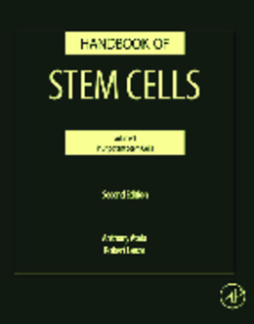
Additional Information
Book Details
Abstract
New discoveries in the field of stem cells increasingly dominate the news and scientific literature revealing an avalanche of new knowledge and research tools that are producing therapies for cancer, heart disease, diabetes, and a wide variety of other diseases that afflict humanity. The Handbook of Stem Cells integrates this exciting area of life science, combining in two volumes the requisites for a general understanding of adult and embryonic stem cells. Organized in two volumes entitled Pluripotent Stem Cells and Cell Biology and Adult and Fetal Stem Cells, this work contains contributions from the world’s experts in stem cell research to provide a description of the tools, methods, and experimental protocols needed to study and characterize stem cells and progenitor populations as well as a the latest information of what is known about each specific organ system.
- Provides comprehensive coverage on this highly topical subject
- Contains contributions by the foremost authorities and premiere names in the field of stem cell research
- Companion website - http://booksite.elsevier.com/9780123859426/ - contains over 250 color figures in presentation format
"The Handbook of Stem Cells, edited by Robert Lanza and colleagues, is an ambitious new text that achieves extraordinary completeness and inclusiveness...the editors have succeeded in putting together a reference that is broad enough in scope, but sufficiently detailed and rigorous, to be of real interest to both new and seasoned investigators in the field."
-Steve Goldman, University of Rechester Medical Center, in NATURE CELL BIOLOGY (April 2005, Volume 7, No. 4)
"I am firmly convinced this is a set every biologist and physician, whatsoever his specialty, must have on his desk."
--CarloAlberto Redi, Book review editor for the EUROPEAN JOURNAL OF HISTOCHEMISTRY (49/1)
"...a collection of definitive articles by the world's experts... the research outlined in this volume is equally certain to contribute to cures for cancer and for a large number of other less famous diseases - many of mysterious origin - that presently represent terrible afflictions for humanity."
--Bruce Alberts, President of the National Academy of Sciences (from the Foreword to Volume 1)
"These books make an invaluable contribution to the education of researchers and clinicians both of the present day and of the future. They should be available in libraries of all biology and medical schools as well as those of companies and research institutions."
--Ian Wilmut in Times Higher Education Supplement
"...the Handbook of Stem Cells is highly recommended primarily as a reference for scientists in the field of animal development...Academic medical libraries and other academic or special libraries serving researchers in cell and developmental biology will particularly benefit from having this handbook available."
--Susan Kendall, Health Sciences Librarian, Michigan State University Library in E-Streams (February 2005)
